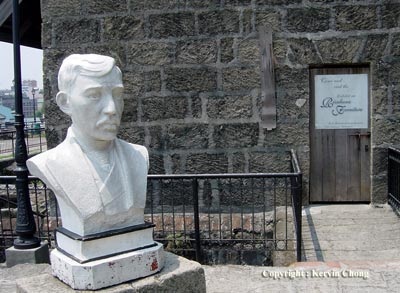Of Colonization, oppression and freedom
Pic: A bust of Jose Rizal outside the room where he resided before the day of his execution (located in Fort Santiago), Renaissance man, man of letters, patriot, social reformer, doctor, revolutionary, visionary and martyr. This eminent figure though not solely responsible, is the figure head for the Independence movement in the Philippines. His death was the spark needed to ignite the people to launch a revolution to overthrow the Spanish colonizers and form the First Republic. The Philippines was the earliest nation to be a free country in the region, sparking off other revolutions in Indonesia, Malaysia and Vietnam. Intramuros, Manila, Philippines, 2004.
The Philippine people has experienced colonial rule ever since the beginning of time, from the Spanish, Japanese and later the Americans. The influence of these has borne deeply into the psyche of the locals and to this day, has led to a search for a Philippines identity that may never be resolved. What is their culture? Who are they? What are their traditions? What is truly Filipino? The people can no longer distinct themselves as intermarriages between locals and the various colonizers has led to one of the most truly homogenous societies in Asia, one not separated by the yoke of race but proudly cite “We are Filipinos”, not unlike Malaysians who would most undoubtedly state race first before nationality, “Chinese Malaysian”, “Indian Malaysian”, “Malay Malaysian” or “Foreigner”. Truly a phenomenon I admire in the Filipinos.
The Philippine people are one of the largest diasporas in the world, a brain drain resulting in most of the brilliant minds of the country emigrating to other countries for the chance to better their lot; from professionals who wish for better facilities to the maids and workers that wish to escape the drudgery of poverty and joblessness in their own country. It is estimated that every family in the Philippines has a member residing somewhere on the globe. Most Malaysians can see this clearly with our throngs of Filipino maids (some even with degrees or masters), construction workers, eminent professors and professional workers. Yet always no matter which country they decide to reside in, they always stay true to their homeland and will always stay Filipinos true and true.





No comments:
Post a Comment